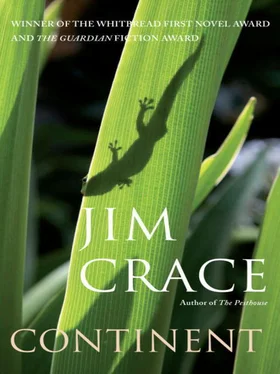So back to the limousine and a cool drive to the city, praying in the stench of button cloth and recycled air for deliverance from Moon Death. So back across scrub to my Evening Desk in the inner room.
STARTING a piece of work is a simple matter for those with purpose: a desk, some fine inks and brushes, a little chalk dust (blotting paper is untrustworthy) and a good light are all that are required.
Exercises first. The calligrapher’s hands are tense from mixing his inks, perhaps, or from oversleeping with bad dreams. They must be relaxed. The nervousness must be worked out on scrap paper until the pen and brush strokes are unhesitant, firm and decisive. Then he can embark on the warp and weft of design, on the complex challenges of reconciling the age-old rules which govern the placing of diacritical signs with the vexatious oddities of Siddilic orthography. And now the letters must be worked again to develop fully the equilibrium of dimensions, to reveal balance and rhythm, to express meaning through form. Then the calligrapher should leave his work and eat a little, walk perhaps to a friend’s house, bathe, sleep a little. Let the letters brew. He is seeking beauty of the highest intellectual order, the most contemplative, the most civilized and sophisticated. There can be no haste.
Then, refreshed, the calligrapher looks at his first drafts again. He studies them at another desk, under a new light. The decorative themes curl around the letters under his gaze. The Kufic and cursive debate before his eyes and present their conclusions. He sits with clean parchment, newly mixed inks, his head not spinning but calm with certainties. This is the easiest and the final draft.
I HAVE NOT been so fortunate. The Minister’s head of protocol came today, chewing gum. He enquired about the progress of my great work. Exhibition dates, he said, had been arranged.
‘Well,’ I explained, ‘I have nothing to show you.’
‘Then start quickly. You don’t have time.’
‘I am an old man,’ I said. ‘I have lost my talents.’ I held up a (frankly) excessively shaky hand. ‘I’ve sat at my three desks for two weeks. I have wasted a ream of paper and a half-kilo of ink. Nothing comes. I don’t have ideas any longer. You’d better cancel your exhibitions.’
The aide-de-camp looked severely discountenanced. He rolled his chewing gum round his mouth. He looked around the house for some evidence of deceit.
‘The Minister isn’t going to be pleased,’ he said eventually. ‘We had an agreement with you.’
I shrugged. I hadn’t agreed to anything.
‘You’ve been using the government car! You’ve been using the government driver! Corruption! Fraud!’
I shrugged again. My hand was really shaking.
‘You’ll die in prison,’ he said. ‘We’ll burn your house.’ He extemporized dreadful fates for a few moments. Then he put up his hands, palms out, at chest level, to indicate that he had discovered a solution and that the threats were now ended. ‘Say nothing to the Minister,’ he said. ‘The Minister has made it my responsibility. You understand. I can make it easy for you. You won’t let me down because I can be a very cruel man. Call your servant.’
Sabino came through from the yard and sat down, as instructed, on the tiled floor. The aide-de-camp lit a cigarette and drew on it a few times until its ash burned bright. Then he stubbed it out on Sabino’s head. The odour of burnt hair joined the smell of tobacco. Sabino did not seem to feel anything except fear and apprehension. The aide-de-camp and head of Ministerial protocol took the gum from his mouth and ground it, too, into Sabino’s scalp. ‘There,’ he said.
‘Bravo.’
‘This is just to give you an idea,’ he explained. ‘Now, to business.’ He placed a thick envelope of banknotes on Sabino’s head. It balanced there. A fortune. ‘That should help you find inspiration,’ he said, and left my house with only a fraction of the ceremony with which he had entered it. I have seen many strange things in my life and met many foolish men — but this was the strangest and he was the most foolish.
I WAS SPENDING more and more time on my bed in the company of my gecko. I could think of little but work. But I produced nothing at my desks except doodles in geometric arabesque, mockeries of script. I slept on my back as recommended by the great calligrapher, Mir Ali of Tabriz. He had been thus inspired to devise Nasta’liq, the hanging script of the Muslims. A partridge had appeared to him in a dream and instructed him to shape letters like the wings of a bird. But all I dreamt of was young, young girls. Should I shape letters like young girls for the Minister’s great exhibition?
SABINO HAS fled from me. He fears for his life. Now I have no one to prepare my food, to wash my gowns, to walk into the market for my few provisions.
I walk each day at dusk, just as the moon starts to show itself low on the horizon, to what remain of the market booths. I enjoy myself. People call out to me as they used to when I had a booth of my own. I am a celebrity here, now that the Minister has visited me and Americans have made off with my shop fronts. I buy some fish and a few vegetables. I sit in the Syrian’s bar and drink tea while small boys, on hire for a few coins, run to fetch my clean washing or to purchase some heavy item. The Syrian sits with me and complains bitterly: custom is bad, too many laws, too many taxes, the young are disrespectful, an honest man cannot make his honest fortune, thieves everywhere, nobody knows how hard he works, life is cruel and expensive, the heat.
‘Tell me, sir,’ he asked me one day. ‘What must a businessman do? He must follow the market, am I correct? Supply and demand. You are involved in this, so you will understand… ‘ He paused to order fresh tea and to whet my curiosity. ‘When that first American bought Duni’s shop front, my ears were prickling like any good businessman’s. Three thousand dollars! For a shop front? Well, I saw a chance. The market was full of tourists. My bar was full of tourists. All they talked of was you, your work, Siddilic script. I sat with them at these tables, to improve my English. Did I know you, they wanted to know. Did you have any work for sale? Not shop fronts. Shop fronts were too big. Something small. Something that could be rolled up and taken home in a suitcase. Well, no, I had nothing. But a businessman never says no. “Come back in three days,” I told them, “and then, maybe, I will have found something. But it will be expensive, of course.” “Never mind ‘expensive’,” they said. So…’ The Syrian smiled at his own cunning. ‘I went to somebody — let us not say who — and told him: “I can pay such and such for good Siddilic script. By the master, of course. Nothing too large, mind. With the master’s authentic signature, naturally!” And in two days my friend returned with a parchment. A very nice piece. A good clear signature.
‘I wasn’t fooled. The design was beautiful but the ink had been applied by an amateur in a hurry. The ink was poor school ink and had dried unevenly. It was a copy. But a skilfully signed copy. I paid my friend such and such. And one day later I sold to an American for such and such and such. Good business. Perfectly legal. What am I, an expert on scripts? How should I know?
‘So, I told my friend: “Good, quite good, bring me some more, but sell only to me.” This is also good business practice: control the supply, establish a modest monopoly, wait for the price to rise, sell. Simple. Second nature to a Syrian. Imagine, then, my storeroom full of your beautiful work, rising in price day by day, minute by minute. I was going to be a rich, rich man. Already my friend was a wealthy man from the money I had paid him. Already I was dreaming of dying in Damascus, of seeing my brothers in Aleppo for the first time in twenty years, of sitting with my toes in the Euphrates, of waving goodbye to business forever.
Читать дальше












